Corporate Event Management Report: Evolve Events Analysis and Planning
VerifiedAdded on 2023/01/10
|15
|5028
|76
Report
AI Summary
This report provides a comprehensive overview of corporate event management, examining various aspects from different types of events to planning strategies. It begins with an executive summary and introduction to the topic, followed by a detailed analysis of different corporate events such as conferences, seminars, team-building events, and trade shows, and compares them with leisure events, highlighting key differences. The report explores the criteria for identifying potential audiences and the key elements of a feasibility study. It also includes the development of a corporate event plan, evaluating the processes for planning and promoting the event and critically evaluating strategic options. The report concludes with recommendations and alternative solutions for effective event management, supported by references. The report uses the context of Evolve Events, an event management company, to illustrate practical applications.
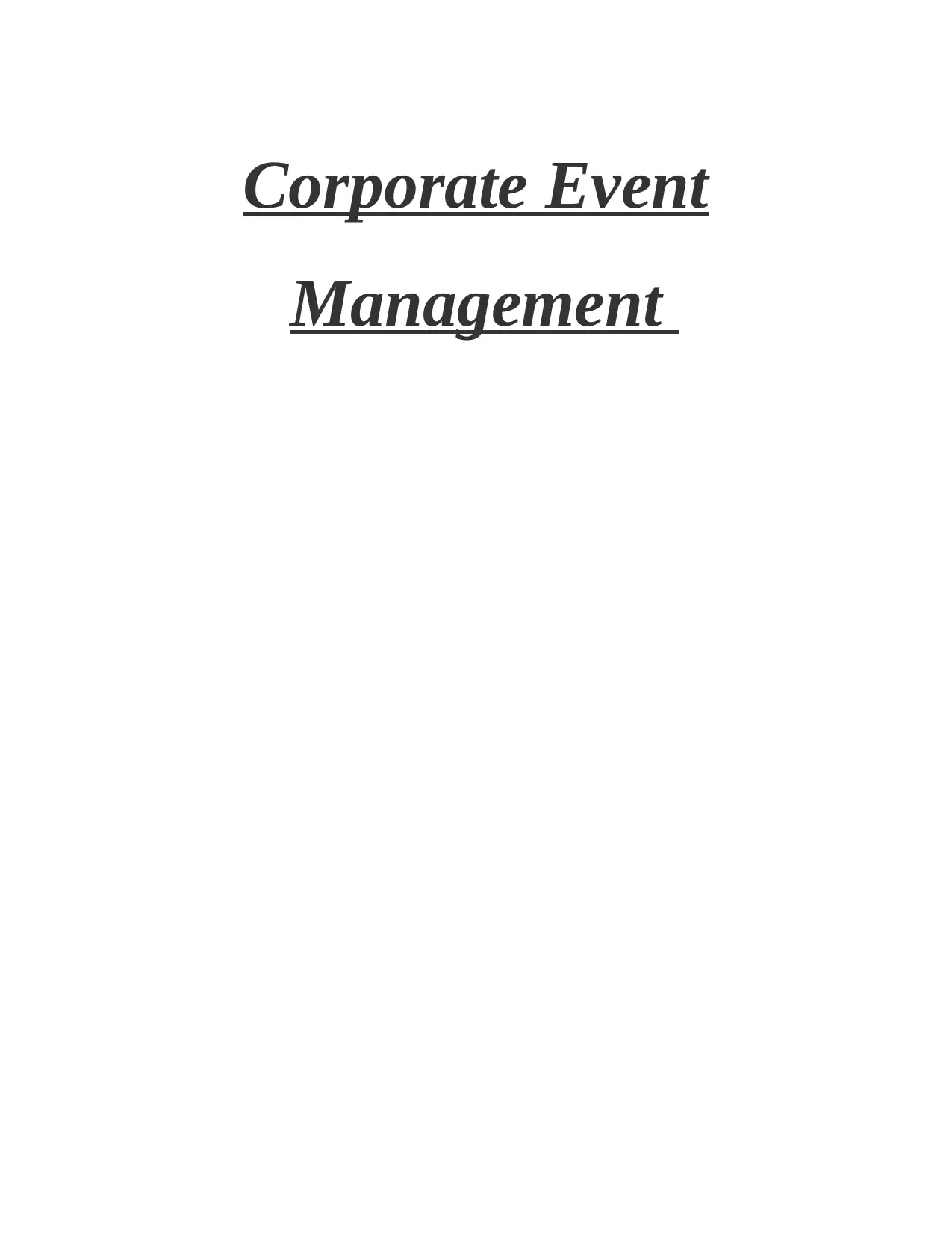
Corporate Event
Management
Management
Paraphrase This Document
Need a fresh take? Get an instant paraphrase of this document with our AI Paraphraser
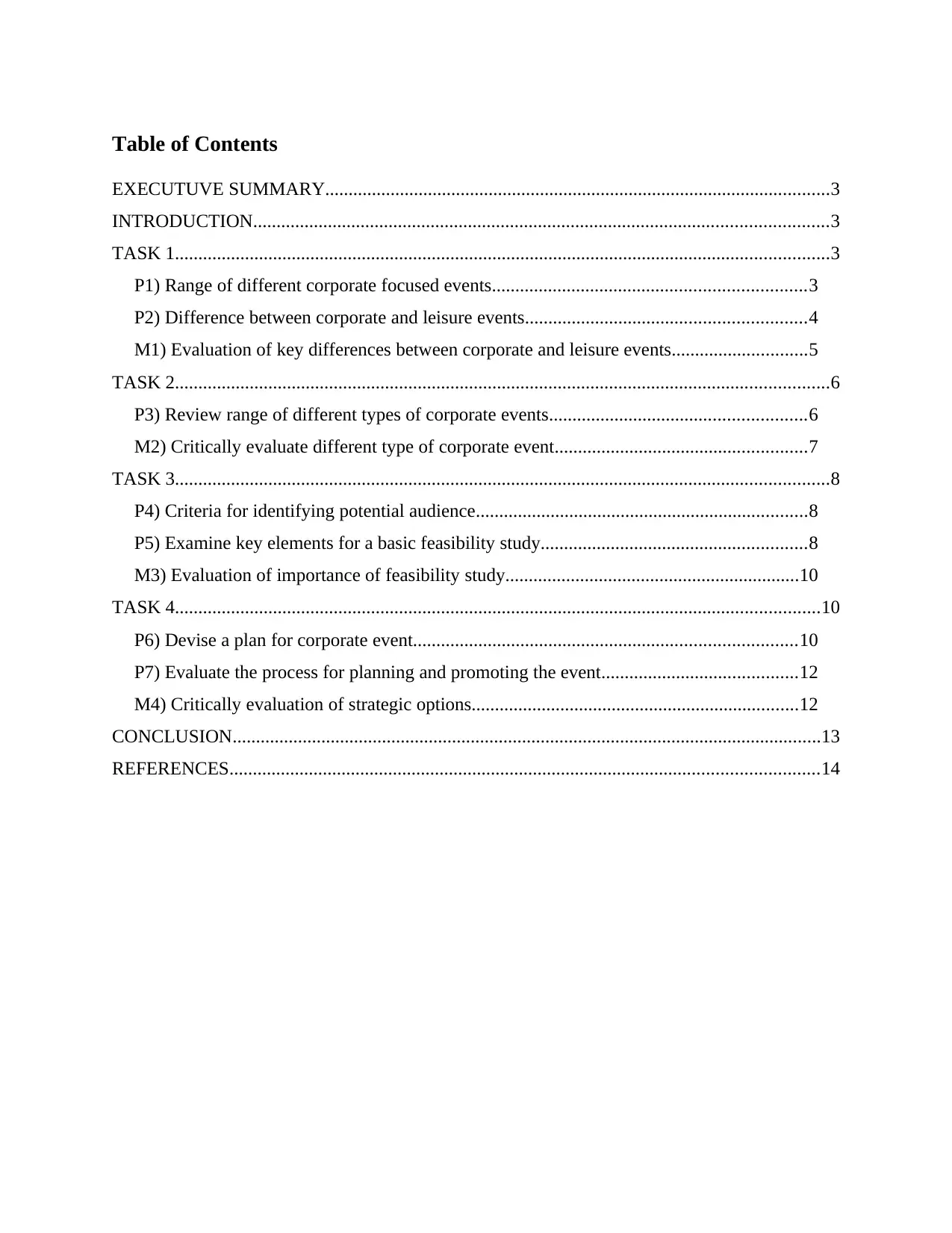
Table of Contents
EXECUTUVE SUMMARY............................................................................................................3
INTRODUCTION...........................................................................................................................3
TASK 1............................................................................................................................................3
P1) Range of different corporate focused events...................................................................3
P2) Difference between corporate and leisure events............................................................4
M1) Evaluation of key differences between corporate and leisure events.............................5
TASK 2............................................................................................................................................6
P3) Review range of different types of corporate events.......................................................6
M2) Critically evaluate different type of corporate event......................................................7
TASK 3............................................................................................................................................8
P4) Criteria for identifying potential audience.......................................................................8
P5) Examine key elements for a basic feasibility study.........................................................8
M3) Evaluation of importance of feasibility study...............................................................10
TASK 4..........................................................................................................................................10
P6) Devise a plan for corporate event..................................................................................10
P7) Evaluate the process for planning and promoting the event..........................................12
M4) Critically evaluation of strategic options......................................................................12
CONCLUSION..............................................................................................................................13
REFERENCES..............................................................................................................................14
EXECUTUVE SUMMARY............................................................................................................3
INTRODUCTION...........................................................................................................................3
TASK 1............................................................................................................................................3
P1) Range of different corporate focused events...................................................................3
P2) Difference between corporate and leisure events............................................................4
M1) Evaluation of key differences between corporate and leisure events.............................5
TASK 2............................................................................................................................................6
P3) Review range of different types of corporate events.......................................................6
M2) Critically evaluate different type of corporate event......................................................7
TASK 3............................................................................................................................................8
P4) Criteria for identifying potential audience.......................................................................8
P5) Examine key elements for a basic feasibility study.........................................................8
M3) Evaluation of importance of feasibility study...............................................................10
TASK 4..........................................................................................................................................10
P6) Devise a plan for corporate event..................................................................................10
P7) Evaluate the process for planning and promoting the event..........................................12
M4) Critically evaluation of strategic options......................................................................12
CONCLUSION..............................................................................................................................13
REFERENCES..............................................................................................................................14
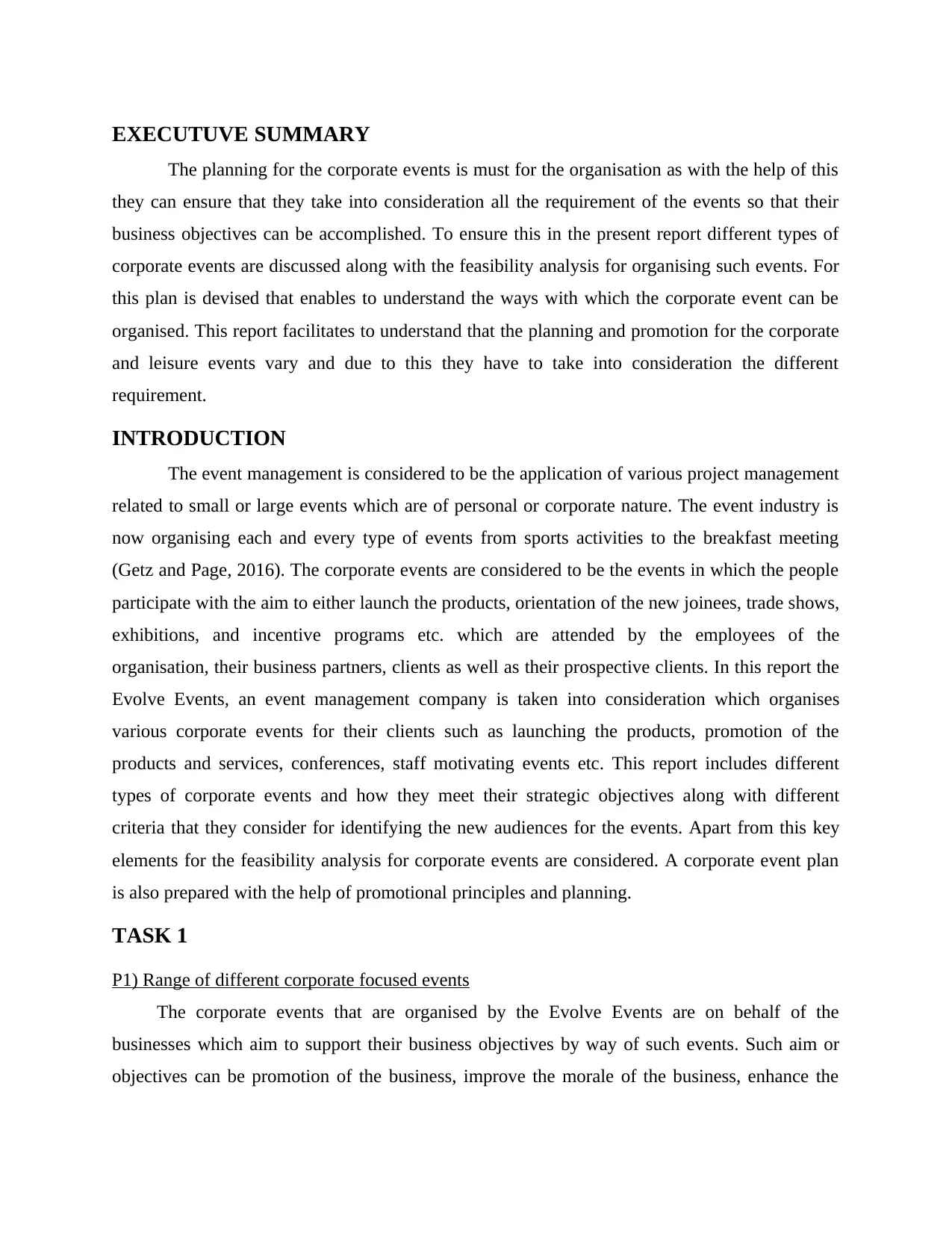
EXECUTUVE SUMMARY
The planning for the corporate events is must for the organisation as with the help of this
they can ensure that they take into consideration all the requirement of the events so that their
business objectives can be accomplished. To ensure this in the present report different types of
corporate events are discussed along with the feasibility analysis for organising such events. For
this plan is devised that enables to understand the ways with which the corporate event can be
organised. This report facilitates to understand that the planning and promotion for the corporate
and leisure events vary and due to this they have to take into consideration the different
requirement.
INTRODUCTION
The event management is considered to be the application of various project management
related to small or large events which are of personal or corporate nature. The event industry is
now organising each and every type of events from sports activities to the breakfast meeting
(Getz and Page, 2016). The corporate events are considered to be the events in which the people
participate with the aim to either launch the products, orientation of the new joinees, trade shows,
exhibitions, and incentive programs etc. which are attended by the employees of the
organisation, their business partners, clients as well as their prospective clients. In this report the
Evolve Events, an event management company is taken into consideration which organises
various corporate events for their clients such as launching the products, promotion of the
products and services, conferences, staff motivating events etc. This report includes different
types of corporate events and how they meet their strategic objectives along with different
criteria that they consider for identifying the new audiences for the events. Apart from this key
elements for the feasibility analysis for corporate events are considered. A corporate event plan
is also prepared with the help of promotional principles and planning.
TASK 1
P1) Range of different corporate focused events
The corporate events that are organised by the Evolve Events are on behalf of the
businesses which aim to support their business objectives by way of such events. Such aim or
objectives can be promotion of the business, improve the morale of the business, enhance the
The planning for the corporate events is must for the organisation as with the help of this
they can ensure that they take into consideration all the requirement of the events so that their
business objectives can be accomplished. To ensure this in the present report different types of
corporate events are discussed along with the feasibility analysis for organising such events. For
this plan is devised that enables to understand the ways with which the corporate event can be
organised. This report facilitates to understand that the planning and promotion for the corporate
and leisure events vary and due to this they have to take into consideration the different
requirement.
INTRODUCTION
The event management is considered to be the application of various project management
related to small or large events which are of personal or corporate nature. The event industry is
now organising each and every type of events from sports activities to the breakfast meeting
(Getz and Page, 2016). The corporate events are considered to be the events in which the people
participate with the aim to either launch the products, orientation of the new joinees, trade shows,
exhibitions, and incentive programs etc. which are attended by the employees of the
organisation, their business partners, clients as well as their prospective clients. In this report the
Evolve Events, an event management company is taken into consideration which organises
various corporate events for their clients such as launching the products, promotion of the
products and services, conferences, staff motivating events etc. This report includes different
types of corporate events and how they meet their strategic objectives along with different
criteria that they consider for identifying the new audiences for the events. Apart from this key
elements for the feasibility analysis for corporate events are considered. A corporate event plan
is also prepared with the help of promotional principles and planning.
TASK 1
P1) Range of different corporate focused events
The corporate events that are organised by the Evolve Events are on behalf of the
businesses which aim to support their business objectives by way of such events. Such aim or
objectives can be promotion of the business, improve the morale of the business, enhance the
⊘ This is a preview!⊘
Do you want full access?
Subscribe today to unlock all pages.

Trusted by 1+ million students worldwide
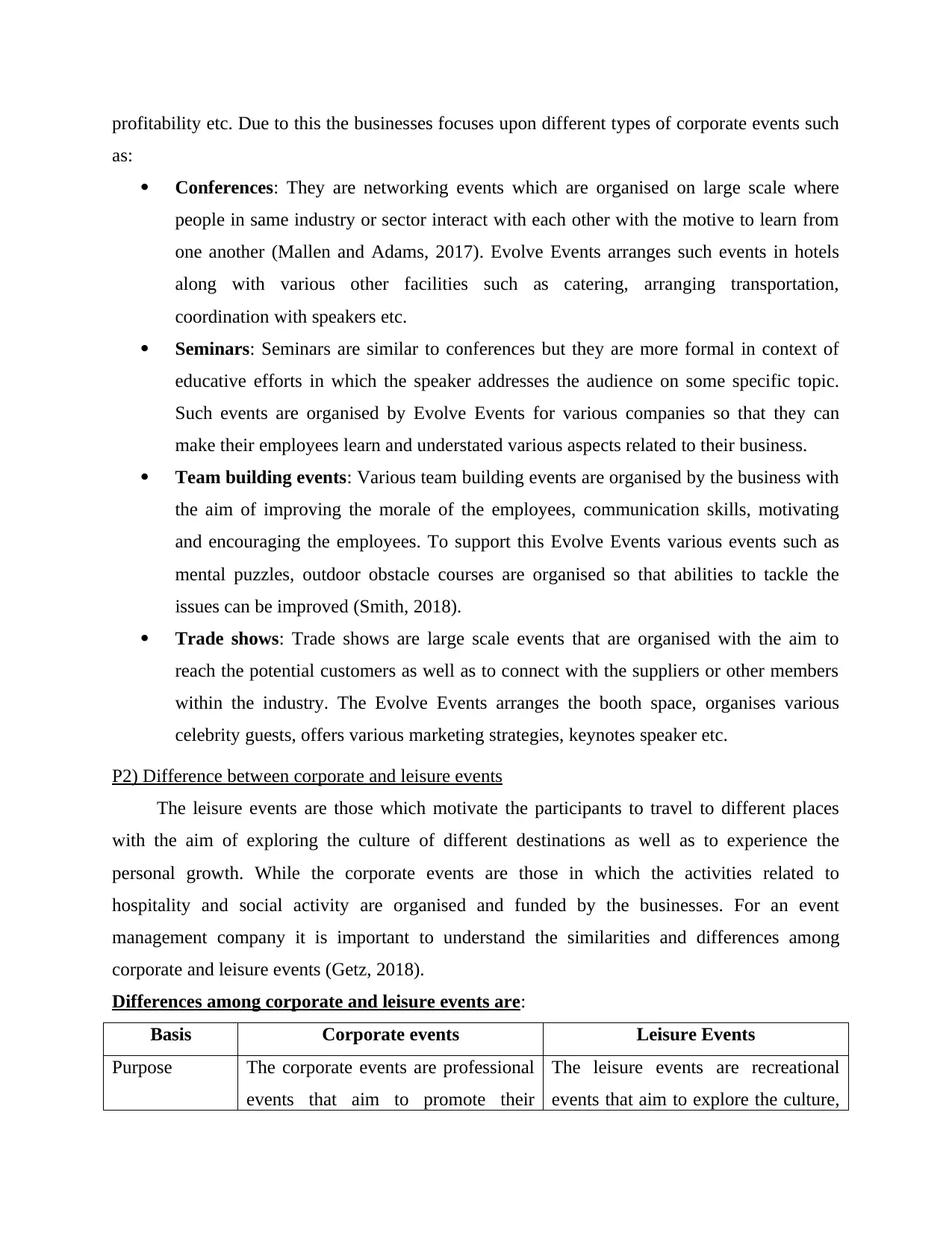
profitability etc. Due to this the businesses focuses upon different types of corporate events such
as:
Conferences: They are networking events which are organised on large scale where
people in same industry or sector interact with each other with the motive to learn from
one another (Mallen and Adams, 2017). Evolve Events arranges such events in hotels
along with various other facilities such as catering, arranging transportation,
coordination with speakers etc.
Seminars: Seminars are similar to conferences but they are more formal in context of
educative efforts in which the speaker addresses the audience on some specific topic.
Such events are organised by Evolve Events for various companies so that they can
make their employees learn and understated various aspects related to their business.
Team building events: Various team building events are organised by the business with
the aim of improving the morale of the employees, communication skills, motivating
and encouraging the employees. To support this Evolve Events various events such as
mental puzzles, outdoor obstacle courses are organised so that abilities to tackle the
issues can be improved (Smith, 2018).
Trade shows: Trade shows are large scale events that are organised with the aim to
reach the potential customers as well as to connect with the suppliers or other members
within the industry. The Evolve Events arranges the booth space, organises various
celebrity guests, offers various marketing strategies, keynotes speaker etc.
P2) Difference between corporate and leisure events
The leisure events are those which motivate the participants to travel to different places
with the aim of exploring the culture of different destinations as well as to experience the
personal growth. While the corporate events are those in which the activities related to
hospitality and social activity are organised and funded by the businesses. For an event
management company it is important to understand the similarities and differences among
corporate and leisure events (Getz, 2018).
Differences among corporate and leisure events are:
Basis Corporate events Leisure Events
Purpose The corporate events are professional
events that aim to promote their
The leisure events are recreational
events that aim to explore the culture,
as:
Conferences: They are networking events which are organised on large scale where
people in same industry or sector interact with each other with the motive to learn from
one another (Mallen and Adams, 2017). Evolve Events arranges such events in hotels
along with various other facilities such as catering, arranging transportation,
coordination with speakers etc.
Seminars: Seminars are similar to conferences but they are more formal in context of
educative efforts in which the speaker addresses the audience on some specific topic.
Such events are organised by Evolve Events for various companies so that they can
make their employees learn and understated various aspects related to their business.
Team building events: Various team building events are organised by the business with
the aim of improving the morale of the employees, communication skills, motivating
and encouraging the employees. To support this Evolve Events various events such as
mental puzzles, outdoor obstacle courses are organised so that abilities to tackle the
issues can be improved (Smith, 2018).
Trade shows: Trade shows are large scale events that are organised with the aim to
reach the potential customers as well as to connect with the suppliers or other members
within the industry. The Evolve Events arranges the booth space, organises various
celebrity guests, offers various marketing strategies, keynotes speaker etc.
P2) Difference between corporate and leisure events
The leisure events are those which motivate the participants to travel to different places
with the aim of exploring the culture of different destinations as well as to experience the
personal growth. While the corporate events are those in which the activities related to
hospitality and social activity are organised and funded by the businesses. For an event
management company it is important to understand the similarities and differences among
corporate and leisure events (Getz, 2018).
Differences among corporate and leisure events are:
Basis Corporate events Leisure Events
Purpose The corporate events are professional
events that aim to promote their
The leisure events are recreational
events that aim to explore the culture,
Paraphrase This Document
Need a fresh take? Get an instant paraphrase of this document with our AI Paraphraser
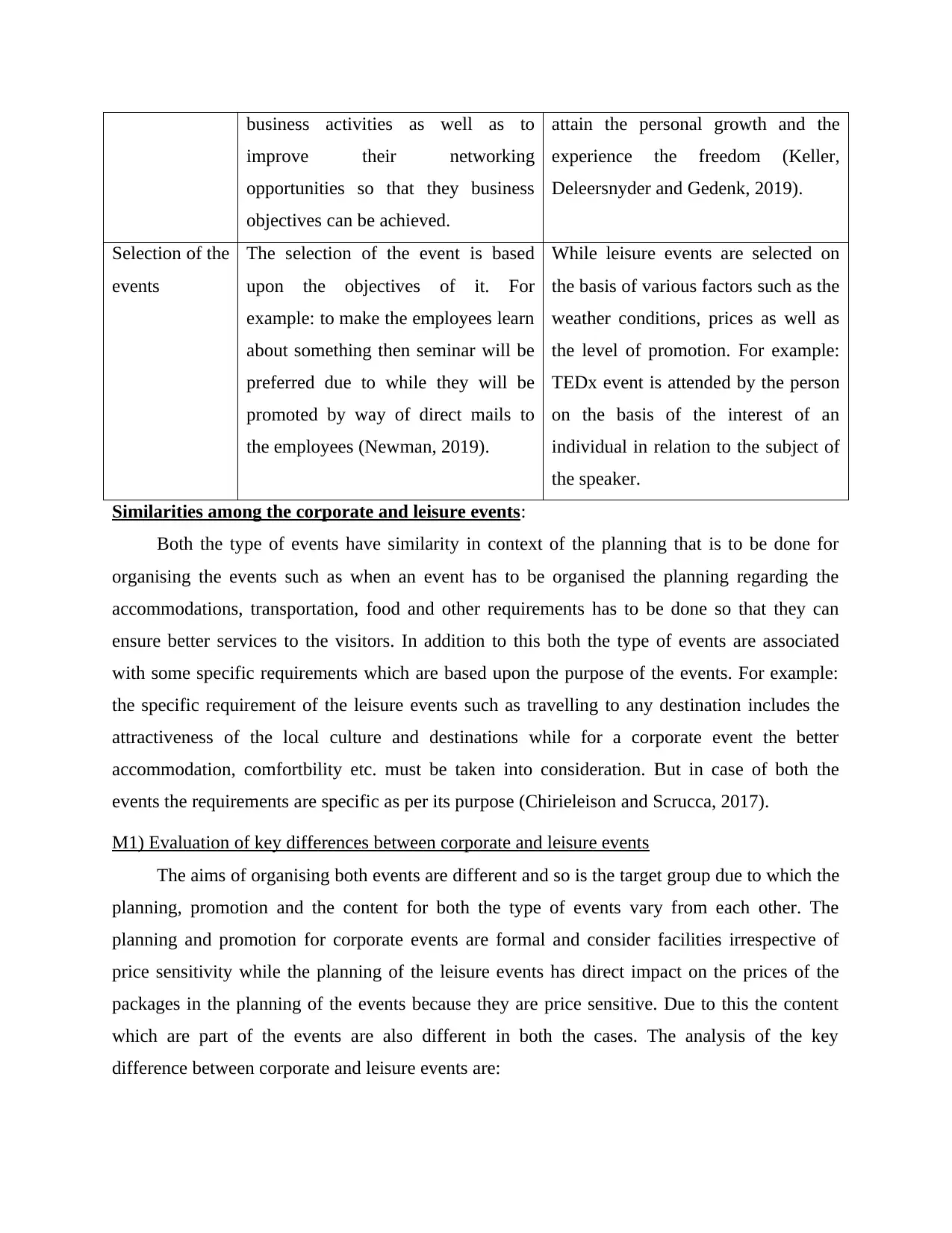
business activities as well as to
improve their networking
opportunities so that they business
objectives can be achieved.
attain the personal growth and the
experience the freedom (Keller,
Deleersnyder and Gedenk, 2019).
Selection of the
events
The selection of the event is based
upon the objectives of it. For
example: to make the employees learn
about something then seminar will be
preferred due to while they will be
promoted by way of direct mails to
the employees (Newman, 2019).
While leisure events are selected on
the basis of various factors such as the
weather conditions, prices as well as
the level of promotion. For example:
TEDx event is attended by the person
on the basis of the interest of an
individual in relation to the subject of
the speaker.
Similarities among the corporate and leisure events:
Both the type of events have similarity in context of the planning that is to be done for
organising the events such as when an event has to be organised the planning regarding the
accommodations, transportation, food and other requirements has to be done so that they can
ensure better services to the visitors. In addition to this both the type of events are associated
with some specific requirements which are based upon the purpose of the events. For example:
the specific requirement of the leisure events such as travelling to any destination includes the
attractiveness of the local culture and destinations while for a corporate event the better
accommodation, comfortbility etc. must be taken into consideration. But in case of both the
events the requirements are specific as per its purpose (Chirieleison and Scrucca, 2017).
M1) Evaluation of key differences between corporate and leisure events
The aims of organising both events are different and so is the target group due to which the
planning, promotion and the content for both the type of events vary from each other. The
planning and promotion for corporate events are formal and consider facilities irrespective of
price sensitivity while the planning of the leisure events has direct impact on the prices of the
packages in the planning of the events because they are price sensitive. Due to this the content
which are part of the events are also different in both the cases. The analysis of the key
difference between corporate and leisure events are:
improve their networking
opportunities so that they business
objectives can be achieved.
attain the personal growth and the
experience the freedom (Keller,
Deleersnyder and Gedenk, 2019).
Selection of the
events
The selection of the event is based
upon the objectives of it. For
example: to make the employees learn
about something then seminar will be
preferred due to while they will be
promoted by way of direct mails to
the employees (Newman, 2019).
While leisure events are selected on
the basis of various factors such as the
weather conditions, prices as well as
the level of promotion. For example:
TEDx event is attended by the person
on the basis of the interest of an
individual in relation to the subject of
the speaker.
Similarities among the corporate and leisure events:
Both the type of events have similarity in context of the planning that is to be done for
organising the events such as when an event has to be organised the planning regarding the
accommodations, transportation, food and other requirements has to be done so that they can
ensure better services to the visitors. In addition to this both the type of events are associated
with some specific requirements which are based upon the purpose of the events. For example:
the specific requirement of the leisure events such as travelling to any destination includes the
attractiveness of the local culture and destinations while for a corporate event the better
accommodation, comfortbility etc. must be taken into consideration. But in case of both the
events the requirements are specific as per its purpose (Chirieleison and Scrucca, 2017).
M1) Evaluation of key differences between corporate and leisure events
The aims of organising both events are different and so is the target group due to which the
planning, promotion and the content for both the type of events vary from each other. The
planning and promotion for corporate events are formal and consider facilities irrespective of
price sensitivity while the planning of the leisure events has direct impact on the prices of the
packages in the planning of the events because they are price sensitive. Due to this the content
which are part of the events are also different in both the cases. The analysis of the key
difference between corporate and leisure events are:
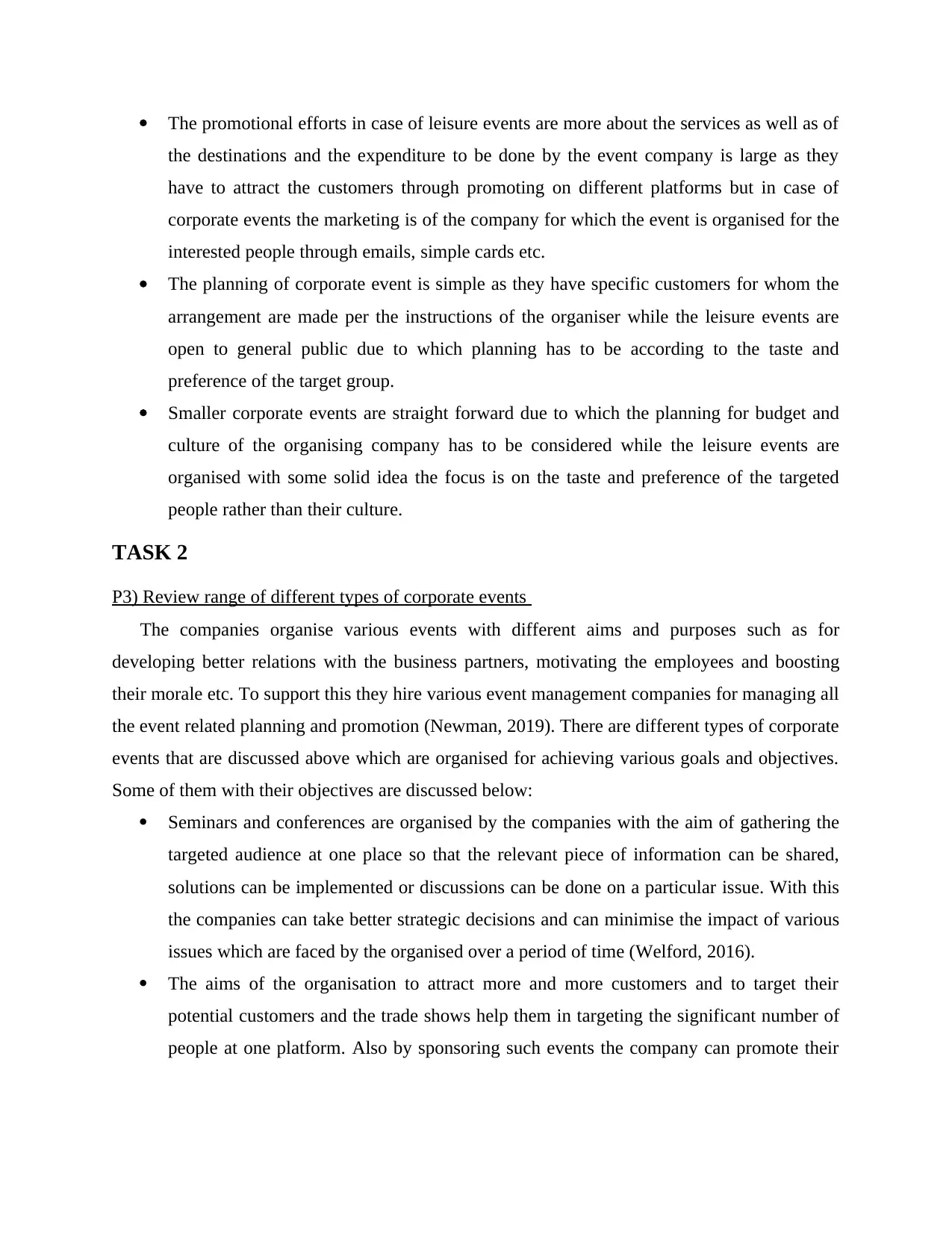
The promotional efforts in case of leisure events are more about the services as well as of
the destinations and the expenditure to be done by the event company is large as they
have to attract the customers through promoting on different platforms but in case of
corporate events the marketing is of the company for which the event is organised for the
interested people through emails, simple cards etc.
The planning of corporate event is simple as they have specific customers for whom the
arrangement are made per the instructions of the organiser while the leisure events are
open to general public due to which planning has to be according to the taste and
preference of the target group.
Smaller corporate events are straight forward due to which the planning for budget and
culture of the organising company has to be considered while the leisure events are
organised with some solid idea the focus is on the taste and preference of the targeted
people rather than their culture.
TASK 2
P3) Review range of different types of corporate events
The companies organise various events with different aims and purposes such as for
developing better relations with the business partners, motivating the employees and boosting
their morale etc. To support this they hire various event management companies for managing all
the event related planning and promotion (Newman, 2019). There are different types of corporate
events that are discussed above which are organised for achieving various goals and objectives.
Some of them with their objectives are discussed below:
Seminars and conferences are organised by the companies with the aim of gathering the
targeted audience at one place so that the relevant piece of information can be shared,
solutions can be implemented or discussions can be done on a particular issue. With this
the companies can take better strategic decisions and can minimise the impact of various
issues which are faced by the organised over a period of time (Welford, 2016).
The aims of the organisation to attract more and more customers and to target their
potential customers and the trade shows help them in targeting the significant number of
people at one platform. Also by sponsoring such events the company can promote their
the destinations and the expenditure to be done by the event company is large as they
have to attract the customers through promoting on different platforms but in case of
corporate events the marketing is of the company for which the event is organised for the
interested people through emails, simple cards etc.
The planning of corporate event is simple as they have specific customers for whom the
arrangement are made per the instructions of the organiser while the leisure events are
open to general public due to which planning has to be according to the taste and
preference of the target group.
Smaller corporate events are straight forward due to which the planning for budget and
culture of the organising company has to be considered while the leisure events are
organised with some solid idea the focus is on the taste and preference of the targeted
people rather than their culture.
TASK 2
P3) Review range of different types of corporate events
The companies organise various events with different aims and purposes such as for
developing better relations with the business partners, motivating the employees and boosting
their morale etc. To support this they hire various event management companies for managing all
the event related planning and promotion (Newman, 2019). There are different types of corporate
events that are discussed above which are organised for achieving various goals and objectives.
Some of them with their objectives are discussed below:
Seminars and conferences are organised by the companies with the aim of gathering the
targeted audience at one place so that the relevant piece of information can be shared,
solutions can be implemented or discussions can be done on a particular issue. With this
the companies can take better strategic decisions and can minimise the impact of various
issues which are faced by the organised over a period of time (Welford, 2016).
The aims of the organisation to attract more and more customers and to target their
potential customers and the trade shows help them in targeting the significant number of
people at one platform. Also by sponsoring such events the company can promote their
⊘ This is a preview!⊘
Do you want full access?
Subscribe today to unlock all pages.

Trusted by 1+ million students worldwide
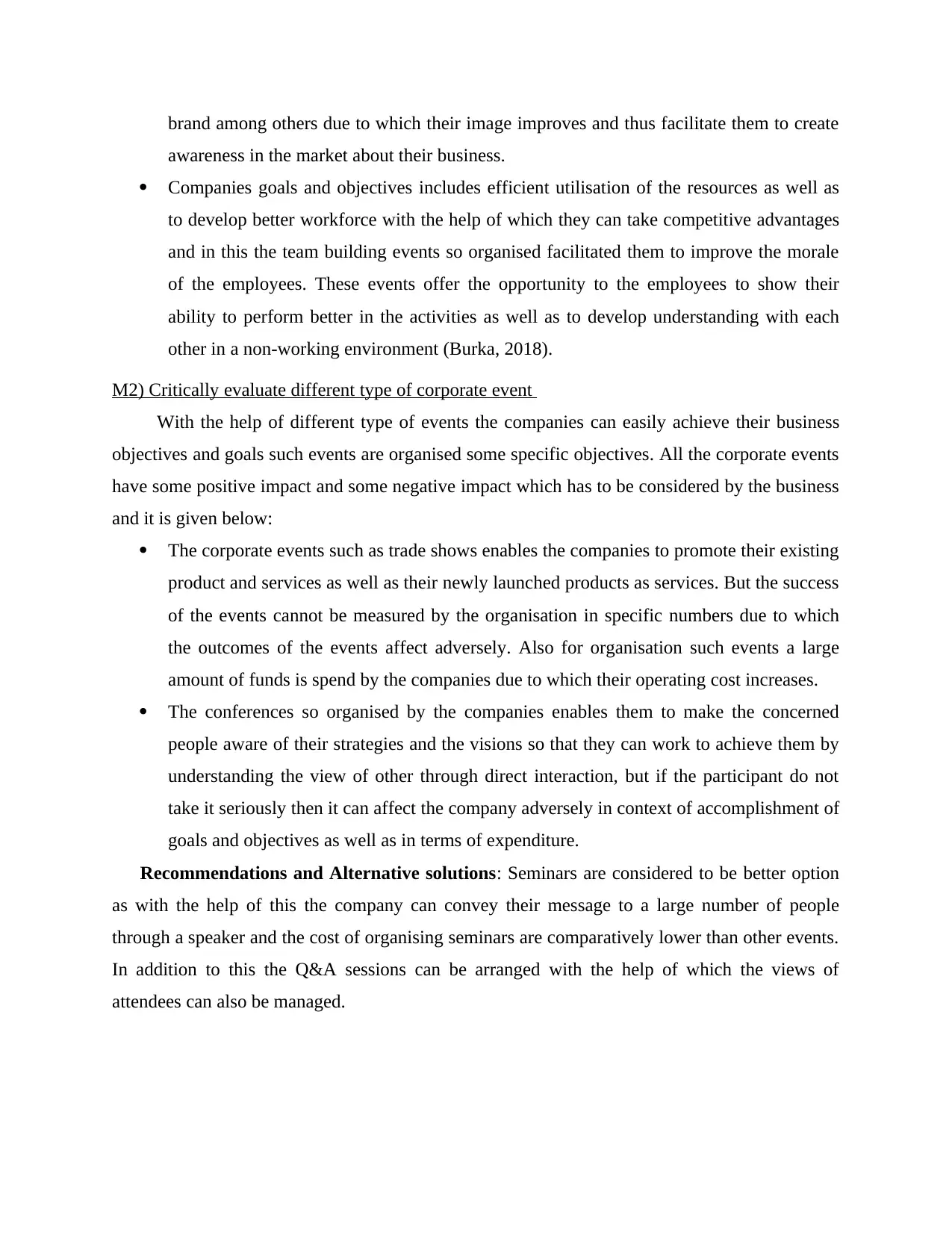
brand among others due to which their image improves and thus facilitate them to create
awareness in the market about their business.
Companies goals and objectives includes efficient utilisation of the resources as well as
to develop better workforce with the help of which they can take competitive advantages
and in this the team building events so organised facilitated them to improve the morale
of the employees. These events offer the opportunity to the employees to show their
ability to perform better in the activities as well as to develop understanding with each
other in a non-working environment (Burka, 2018).
M2) Critically evaluate different type of corporate event
With the help of different type of events the companies can easily achieve their business
objectives and goals such events are organised some specific objectives. All the corporate events
have some positive impact and some negative impact which has to be considered by the business
and it is given below:
The corporate events such as trade shows enables the companies to promote their existing
product and services as well as their newly launched products as services. But the success
of the events cannot be measured by the organisation in specific numbers due to which
the outcomes of the events affect adversely. Also for organisation such events a large
amount of funds is spend by the companies due to which their operating cost increases.
The conferences so organised by the companies enables them to make the concerned
people aware of their strategies and the visions so that they can work to achieve them by
understanding the view of other through direct interaction, but if the participant do not
take it seriously then it can affect the company adversely in context of accomplishment of
goals and objectives as well as in terms of expenditure.
Recommendations and Alternative solutions: Seminars are considered to be better option
as with the help of this the company can convey their message to a large number of people
through a speaker and the cost of organising seminars are comparatively lower than other events.
In addition to this the Q&A sessions can be arranged with the help of which the views of
attendees can also be managed.
awareness in the market about their business.
Companies goals and objectives includes efficient utilisation of the resources as well as
to develop better workforce with the help of which they can take competitive advantages
and in this the team building events so organised facilitated them to improve the morale
of the employees. These events offer the opportunity to the employees to show their
ability to perform better in the activities as well as to develop understanding with each
other in a non-working environment (Burka, 2018).
M2) Critically evaluate different type of corporate event
With the help of different type of events the companies can easily achieve their business
objectives and goals such events are organised some specific objectives. All the corporate events
have some positive impact and some negative impact which has to be considered by the business
and it is given below:
The corporate events such as trade shows enables the companies to promote their existing
product and services as well as their newly launched products as services. But the success
of the events cannot be measured by the organisation in specific numbers due to which
the outcomes of the events affect adversely. Also for organisation such events a large
amount of funds is spend by the companies due to which their operating cost increases.
The conferences so organised by the companies enables them to make the concerned
people aware of their strategies and the visions so that they can work to achieve them by
understanding the view of other through direct interaction, but if the participant do not
take it seriously then it can affect the company adversely in context of accomplishment of
goals and objectives as well as in terms of expenditure.
Recommendations and Alternative solutions: Seminars are considered to be better option
as with the help of this the company can convey their message to a large number of people
through a speaker and the cost of organising seminars are comparatively lower than other events.
In addition to this the Q&A sessions can be arranged with the help of which the views of
attendees can also be managed.
Paraphrase This Document
Need a fresh take? Get an instant paraphrase of this document with our AI Paraphraser
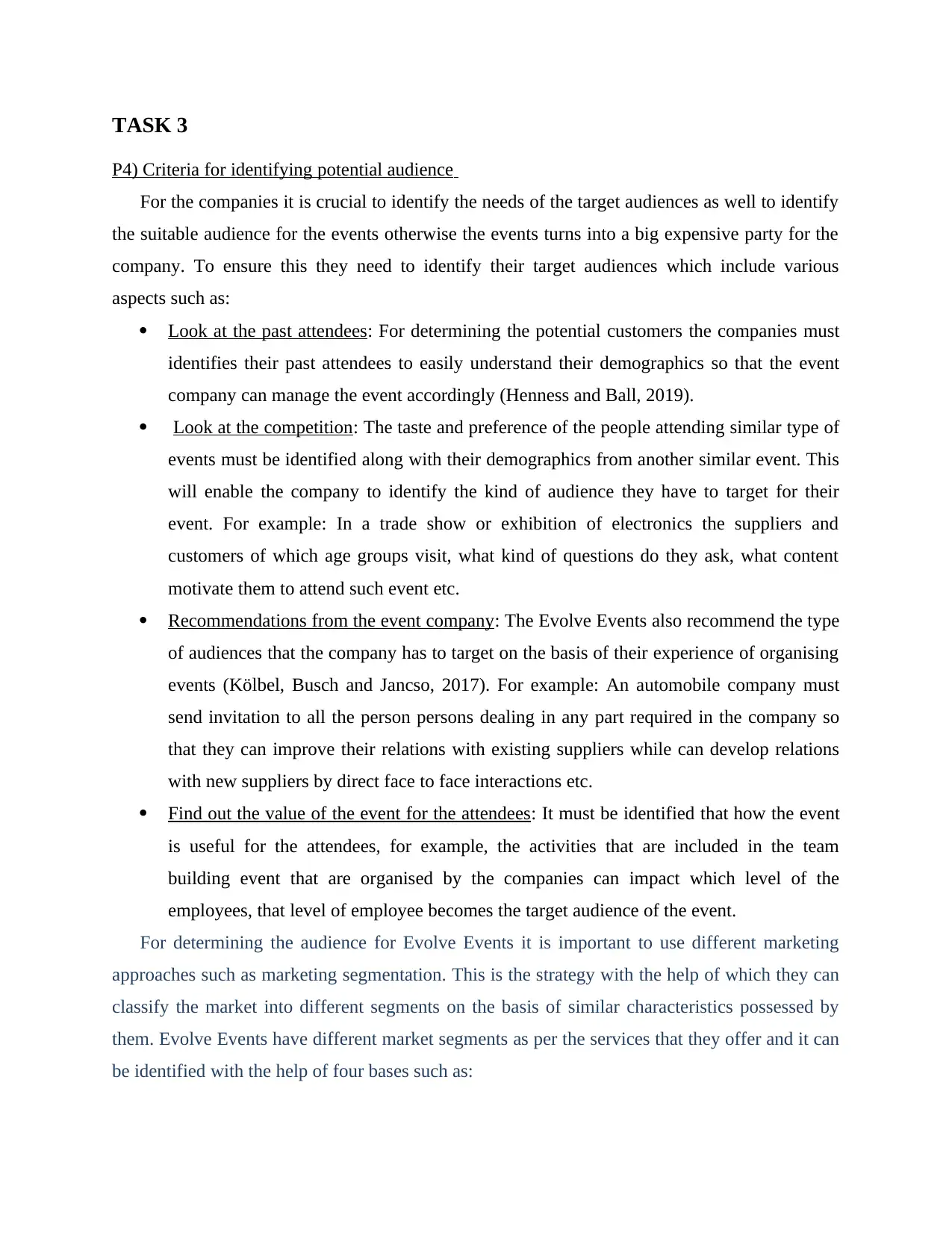
TASK 3
P4) Criteria for identifying potential audience
For the companies it is crucial to identify the needs of the target audiences as well to identify
the suitable audience for the events otherwise the events turns into a big expensive party for the
company. To ensure this they need to identify their target audiences which include various
aspects such as:
Look at the past attendees: For determining the potential customers the companies must
identifies their past attendees to easily understand their demographics so that the event
company can manage the event accordingly (Henness and Ball, 2019).
Look at the competition: The taste and preference of the people attending similar type of
events must be identified along with their demographics from another similar event. This
will enable the company to identify the kind of audience they have to target for their
event. For example: In a trade show or exhibition of electronics the suppliers and
customers of which age groups visit, what kind of questions do they ask, what content
motivate them to attend such event etc.
Recommendations from the event company: The Evolve Events also recommend the type
of audiences that the company has to target on the basis of their experience of organising
events (Kölbel, Busch and Jancso, 2017). For example: An automobile company must
send invitation to all the person persons dealing in any part required in the company so
that they can improve their relations with existing suppliers while can develop relations
with new suppliers by direct face to face interactions etc.
Find out the value of the event for the attendees: It must be identified that how the event
is useful for the attendees, for example, the activities that are included in the team
building event that are organised by the companies can impact which level of the
employees, that level of employee becomes the target audience of the event.
For determining the audience for Evolve Events it is important to use different marketing
approaches such as marketing segmentation. This is the strategy with the help of which they can
classify the market into different segments on the basis of similar characteristics possessed by
them. Evolve Events have different market segments as per the services that they offer and it can
be identified with the help of four bases such as:
P4) Criteria for identifying potential audience
For the companies it is crucial to identify the needs of the target audiences as well to identify
the suitable audience for the events otherwise the events turns into a big expensive party for the
company. To ensure this they need to identify their target audiences which include various
aspects such as:
Look at the past attendees: For determining the potential customers the companies must
identifies their past attendees to easily understand their demographics so that the event
company can manage the event accordingly (Henness and Ball, 2019).
Look at the competition: The taste and preference of the people attending similar type of
events must be identified along with their demographics from another similar event. This
will enable the company to identify the kind of audience they have to target for their
event. For example: In a trade show or exhibition of electronics the suppliers and
customers of which age groups visit, what kind of questions do they ask, what content
motivate them to attend such event etc.
Recommendations from the event company: The Evolve Events also recommend the type
of audiences that the company has to target on the basis of their experience of organising
events (Kölbel, Busch and Jancso, 2017). For example: An automobile company must
send invitation to all the person persons dealing in any part required in the company so
that they can improve their relations with existing suppliers while can develop relations
with new suppliers by direct face to face interactions etc.
Find out the value of the event for the attendees: It must be identified that how the event
is useful for the attendees, for example, the activities that are included in the team
building event that are organised by the companies can impact which level of the
employees, that level of employee becomes the target audience of the event.
For determining the audience for Evolve Events it is important to use different marketing
approaches such as marketing segmentation. This is the strategy with the help of which they can
classify the market into different segments on the basis of similar characteristics possessed by
them. Evolve Events have different market segments as per the services that they offer and it can
be identified with the help of four bases such as:
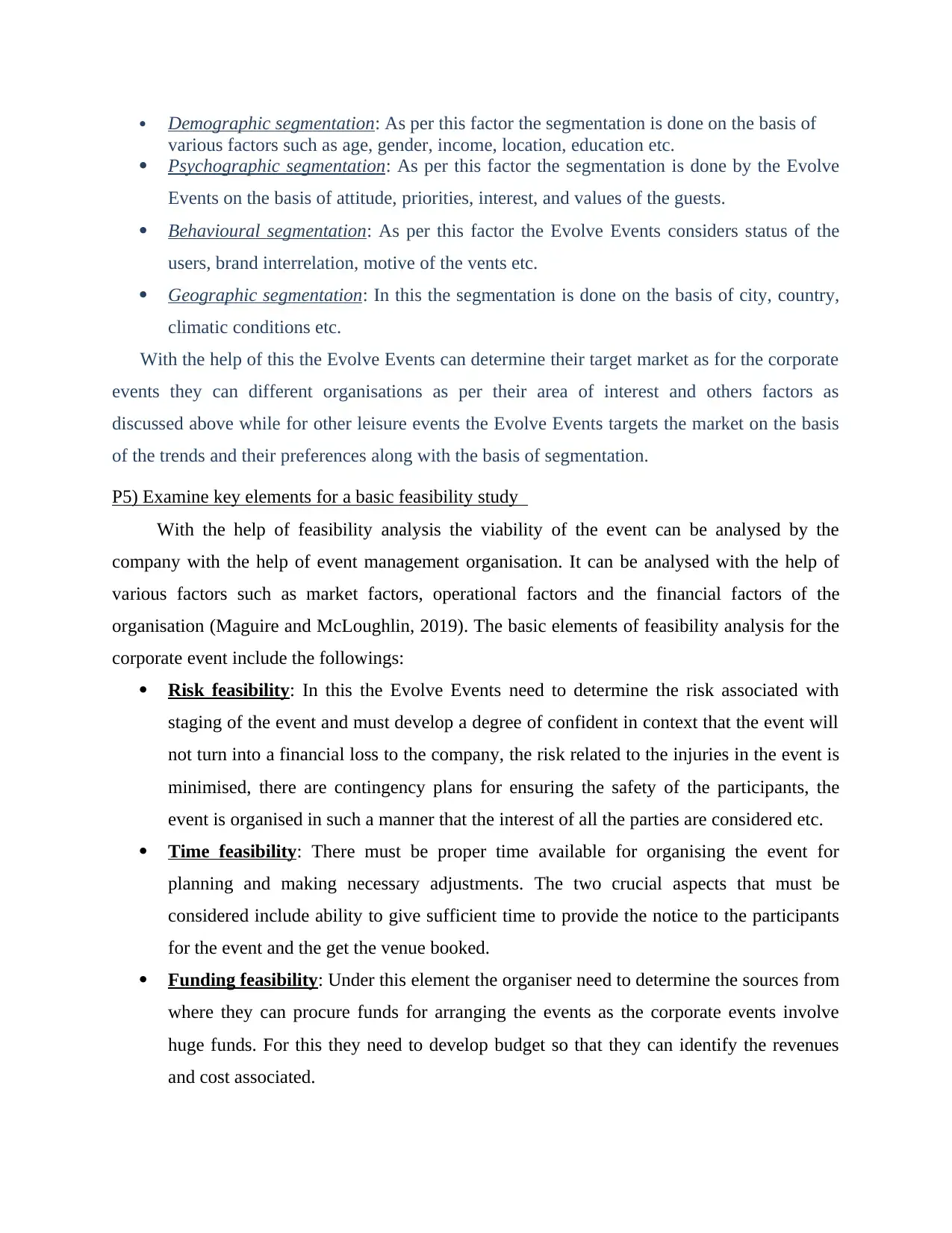
Demographic segmentation: As per this factor the segmentation is done on the basis of
various factors such as age, gender, income, location, education etc.
Psychographic segmentation: As per this factor the segmentation is done by the Evolve
Events on the basis of attitude, priorities, interest, and values of the guests.
Behavioural segmentation: As per this factor the Evolve Events considers status of the
users, brand interrelation, motive of the vents etc.
Geographic segmentation: In this the segmentation is done on the basis of city, country,
climatic conditions etc.
With the help of this the Evolve Events can determine their target market as for the corporate
events they can different organisations as per their area of interest and others factors as
discussed above while for other leisure events the Evolve Events targets the market on the basis
of the trends and their preferences along with the basis of segmentation.
P5) Examine key elements for a basic feasibility study
With the help of feasibility analysis the viability of the event can be analysed by the
company with the help of event management organisation. It can be analysed with the help of
various factors such as market factors, operational factors and the financial factors of the
organisation (Maguire and McLoughlin, 2019). The basic elements of feasibility analysis for the
corporate event include the followings:
Risk feasibility: In this the Evolve Events need to determine the risk associated with
staging of the event and must develop a degree of confident in context that the event will
not turn into a financial loss to the company, the risk related to the injuries in the event is
minimised, there are contingency plans for ensuring the safety of the participants, the
event is organised in such a manner that the interest of all the parties are considered etc.
Time feasibility: There must be proper time available for organising the event for
planning and making necessary adjustments. The two crucial aspects that must be
considered include ability to give sufficient time to provide the notice to the participants
for the event and the get the venue booked.
Funding feasibility: Under this element the organiser need to determine the sources from
where they can procure funds for arranging the events as the corporate events involve
huge funds. For this they need to develop budget so that they can identify the revenues
and cost associated.
various factors such as age, gender, income, location, education etc.
Psychographic segmentation: As per this factor the segmentation is done by the Evolve
Events on the basis of attitude, priorities, interest, and values of the guests.
Behavioural segmentation: As per this factor the Evolve Events considers status of the
users, brand interrelation, motive of the vents etc.
Geographic segmentation: In this the segmentation is done on the basis of city, country,
climatic conditions etc.
With the help of this the Evolve Events can determine their target market as for the corporate
events they can different organisations as per their area of interest and others factors as
discussed above while for other leisure events the Evolve Events targets the market on the basis
of the trends and their preferences along with the basis of segmentation.
P5) Examine key elements for a basic feasibility study
With the help of feasibility analysis the viability of the event can be analysed by the
company with the help of event management organisation. It can be analysed with the help of
various factors such as market factors, operational factors and the financial factors of the
organisation (Maguire and McLoughlin, 2019). The basic elements of feasibility analysis for the
corporate event include the followings:
Risk feasibility: In this the Evolve Events need to determine the risk associated with
staging of the event and must develop a degree of confident in context that the event will
not turn into a financial loss to the company, the risk related to the injuries in the event is
minimised, there are contingency plans for ensuring the safety of the participants, the
event is organised in such a manner that the interest of all the parties are considered etc.
Time feasibility: There must be proper time available for organising the event for
planning and making necessary adjustments. The two crucial aspects that must be
considered include ability to give sufficient time to provide the notice to the participants
for the event and the get the venue booked.
Funding feasibility: Under this element the organiser need to determine the sources from
where they can procure funds for arranging the events as the corporate events involve
huge funds. For this they need to develop budget so that they can identify the revenues
and cost associated.
⊘ This is a preview!⊘
Do you want full access?
Subscribe today to unlock all pages.

Trusted by 1+ million students worldwide
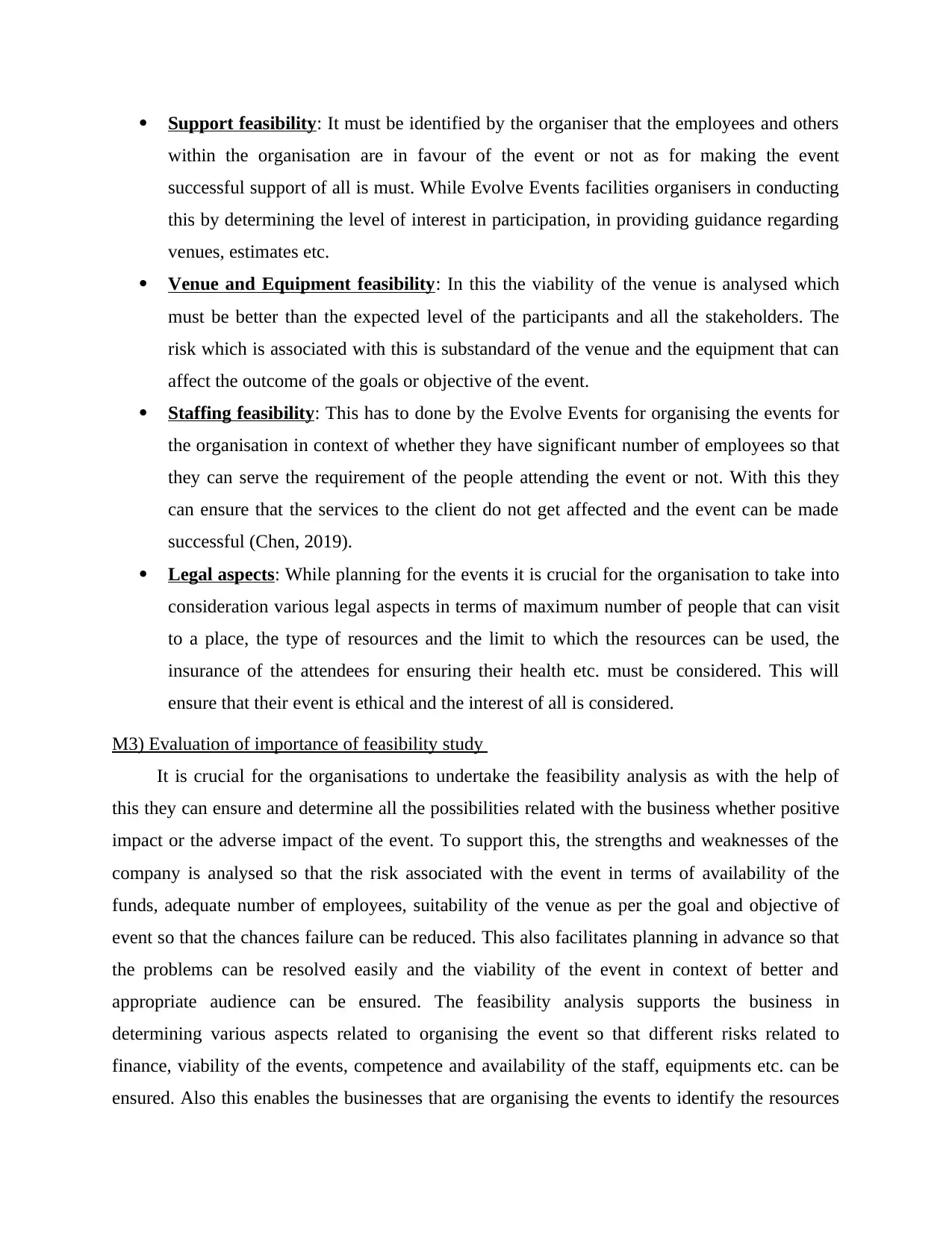
Support feasibility: It must be identified by the organiser that the employees and others
within the organisation are in favour of the event or not as for making the event
successful support of all is must. While Evolve Events facilities organisers in conducting
this by determining the level of interest in participation, in providing guidance regarding
venues, estimates etc.
Venue and Equipment feasibility: In this the viability of the venue is analysed which
must be better than the expected level of the participants and all the stakeholders. The
risk which is associated with this is substandard of the venue and the equipment that can
affect the outcome of the goals or objective of the event.
Staffing feasibility: This has to done by the Evolve Events for organising the events for
the organisation in context of whether they have significant number of employees so that
they can serve the requirement of the people attending the event or not. With this they
can ensure that the services to the client do not get affected and the event can be made
successful (Chen, 2019).
Legal aspects: While planning for the events it is crucial for the organisation to take into
consideration various legal aspects in terms of maximum number of people that can visit
to a place, the type of resources and the limit to which the resources can be used, the
insurance of the attendees for ensuring their health etc. must be considered. This will
ensure that their event is ethical and the interest of all is considered.
M3) Evaluation of importance of feasibility study
It is crucial for the organisations to undertake the feasibility analysis as with the help of
this they can ensure and determine all the possibilities related with the business whether positive
impact or the adverse impact of the event. To support this, the strengths and weaknesses of the
company is analysed so that the risk associated with the event in terms of availability of the
funds, adequate number of employees, suitability of the venue as per the goal and objective of
event so that the chances failure can be reduced. This also facilitates planning in advance so that
the problems can be resolved easily and the viability of the event in context of better and
appropriate audience can be ensured. The feasibility analysis supports the business in
determining various aspects related to organising the event so that different risks related to
finance, viability of the events, competence and availability of the staff, equipments etc. can be
ensured. Also this enables the businesses that are organising the events to identify the resources
within the organisation are in favour of the event or not as for making the event
successful support of all is must. While Evolve Events facilities organisers in conducting
this by determining the level of interest in participation, in providing guidance regarding
venues, estimates etc.
Venue and Equipment feasibility: In this the viability of the venue is analysed which
must be better than the expected level of the participants and all the stakeholders. The
risk which is associated with this is substandard of the venue and the equipment that can
affect the outcome of the goals or objective of the event.
Staffing feasibility: This has to done by the Evolve Events for organising the events for
the organisation in context of whether they have significant number of employees so that
they can serve the requirement of the people attending the event or not. With this they
can ensure that the services to the client do not get affected and the event can be made
successful (Chen, 2019).
Legal aspects: While planning for the events it is crucial for the organisation to take into
consideration various legal aspects in terms of maximum number of people that can visit
to a place, the type of resources and the limit to which the resources can be used, the
insurance of the attendees for ensuring their health etc. must be considered. This will
ensure that their event is ethical and the interest of all is considered.
M3) Evaluation of importance of feasibility study
It is crucial for the organisations to undertake the feasibility analysis as with the help of
this they can ensure and determine all the possibilities related with the business whether positive
impact or the adverse impact of the event. To support this, the strengths and weaknesses of the
company is analysed so that the risk associated with the event in terms of availability of the
funds, adequate number of employees, suitability of the venue as per the goal and objective of
event so that the chances failure can be reduced. This also facilitates planning in advance so that
the problems can be resolved easily and the viability of the event in context of better and
appropriate audience can be ensured. The feasibility analysis supports the business in
determining various aspects related to organising the event so that different risks related to
finance, viability of the events, competence and availability of the staff, equipments etc. can be
ensured. Also this enables the businesses that are organising the events to identify the resources
Paraphrase This Document
Need a fresh take? Get an instant paraphrase of this document with our AI Paraphraser
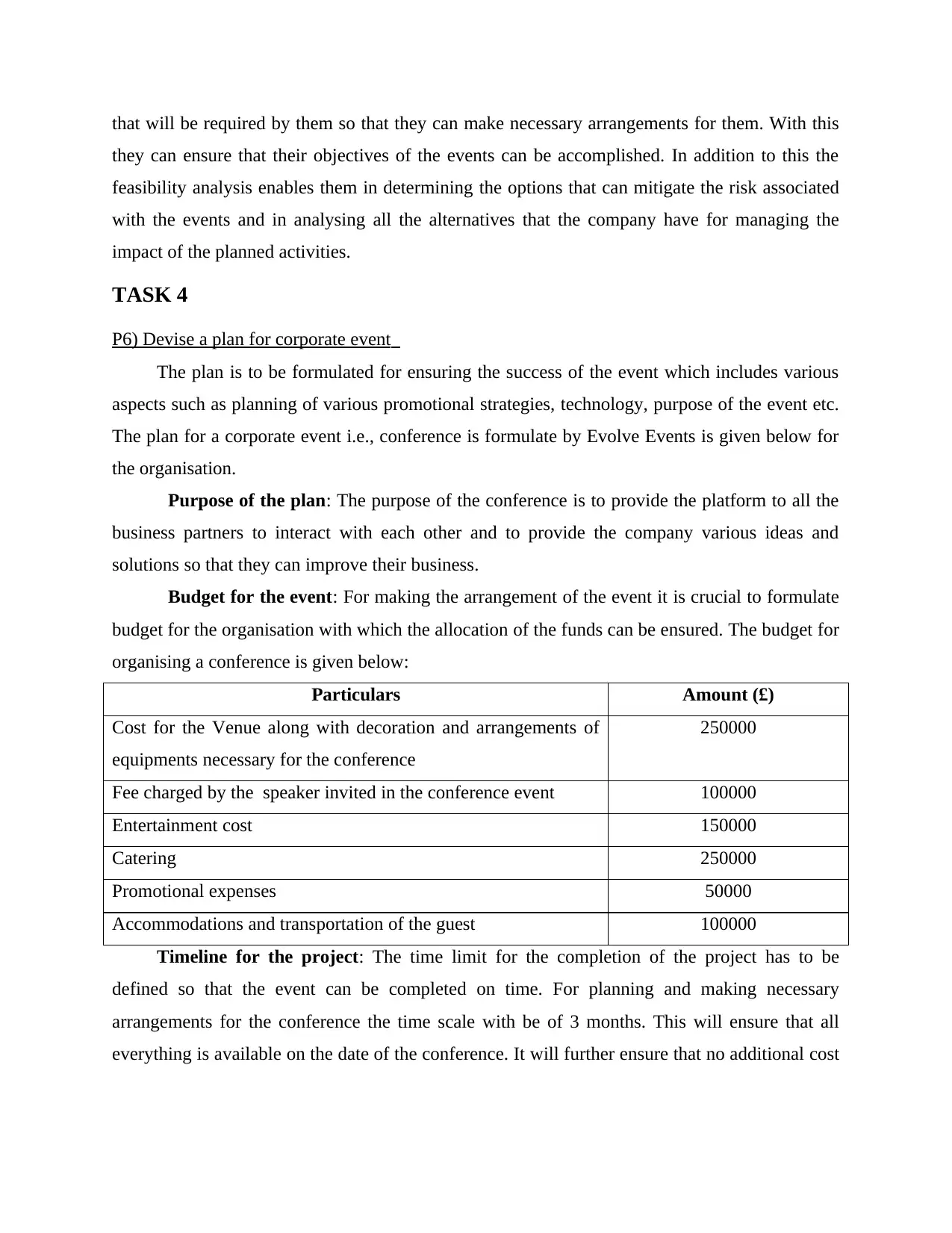
that will be required by them so that they can make necessary arrangements for them. With this
they can ensure that their objectives of the events can be accomplished. In addition to this the
feasibility analysis enables them in determining the options that can mitigate the risk associated
with the events and in analysing all the alternatives that the company have for managing the
impact of the planned activities.
TASK 4
P6) Devise a plan for corporate event
The plan is to be formulated for ensuring the success of the event which includes various
aspects such as planning of various promotional strategies, technology, purpose of the event etc.
The plan for a corporate event i.e., conference is formulate by Evolve Events is given below for
the organisation.
Purpose of the plan: The purpose of the conference is to provide the platform to all the
business partners to interact with each other and to provide the company various ideas and
solutions so that they can improve their business.
Budget for the event: For making the arrangement of the event it is crucial to formulate
budget for the organisation with which the allocation of the funds can be ensured. The budget for
organising a conference is given below:
Particulars Amount (£)
Cost for the Venue along with decoration and arrangements of
equipments necessary for the conference
250000
Fee charged by the speaker invited in the conference event 100000
Entertainment cost 150000
Catering 250000
Promotional expenses 50000
Accommodations and transportation of the guest 100000
Timeline for the project: The time limit for the completion of the project has to be
defined so that the event can be completed on time. For planning and making necessary
arrangements for the conference the time scale with be of 3 months. This will ensure that all
everything is available on the date of the conference. It will further ensure that no additional cost
they can ensure that their objectives of the events can be accomplished. In addition to this the
feasibility analysis enables them in determining the options that can mitigate the risk associated
with the events and in analysing all the alternatives that the company have for managing the
impact of the planned activities.
TASK 4
P6) Devise a plan for corporate event
The plan is to be formulated for ensuring the success of the event which includes various
aspects such as planning of various promotional strategies, technology, purpose of the event etc.
The plan for a corporate event i.e., conference is formulate by Evolve Events is given below for
the organisation.
Purpose of the plan: The purpose of the conference is to provide the platform to all the
business partners to interact with each other and to provide the company various ideas and
solutions so that they can improve their business.
Budget for the event: For making the arrangement of the event it is crucial to formulate
budget for the organisation with which the allocation of the funds can be ensured. The budget for
organising a conference is given below:
Particulars Amount (£)
Cost for the Venue along with decoration and arrangements of
equipments necessary for the conference
250000
Fee charged by the speaker invited in the conference event 100000
Entertainment cost 150000
Catering 250000
Promotional expenses 50000
Accommodations and transportation of the guest 100000
Timeline for the project: The time limit for the completion of the project has to be
defined so that the event can be completed on time. For planning and making necessary
arrangements for the conference the time scale with be of 3 months. This will ensure that all
everything is available on the date of the conference. It will further ensure that no additional cost
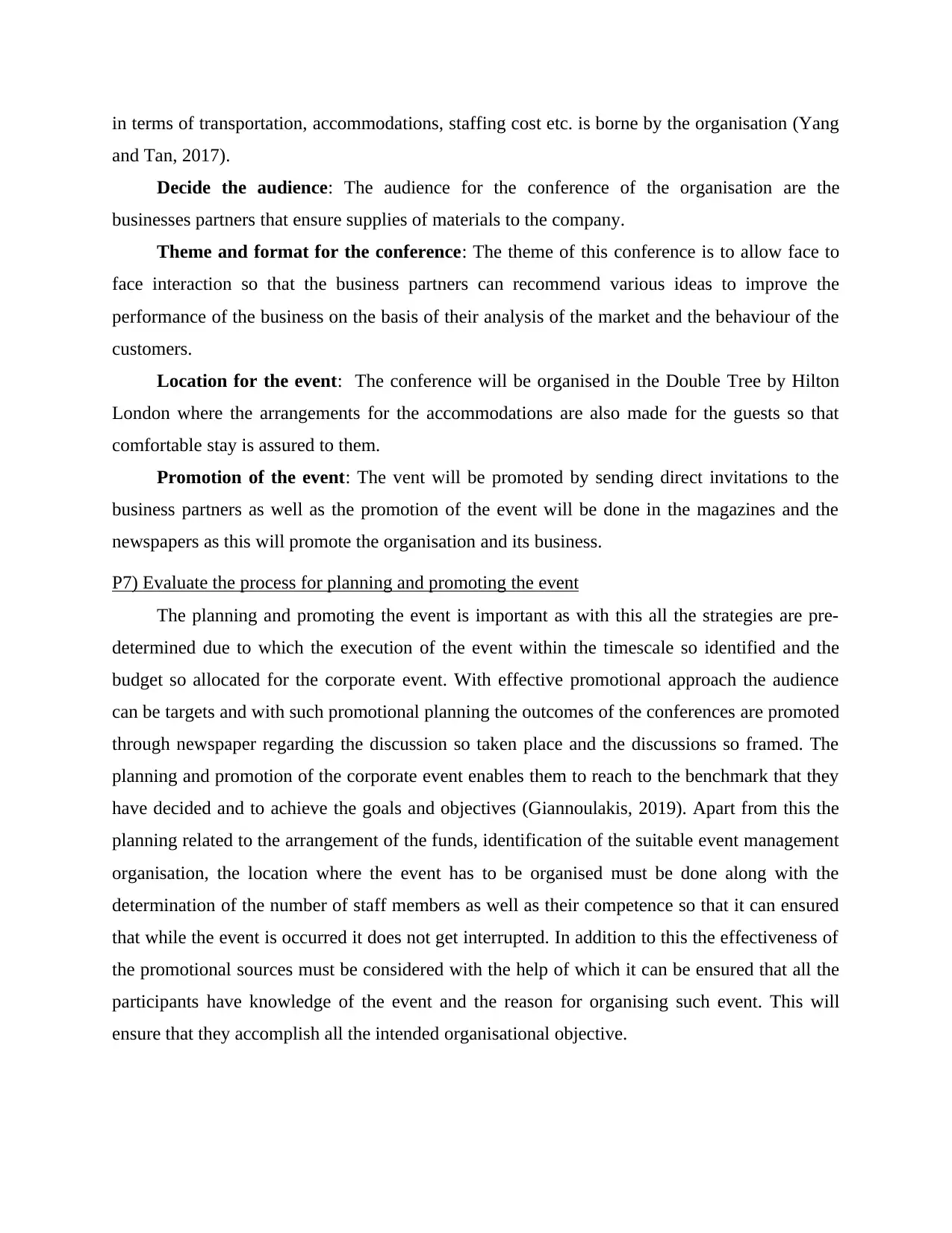
in terms of transportation, accommodations, staffing cost etc. is borne by the organisation (Yang
and Tan, 2017).
Decide the audience: The audience for the conference of the organisation are the
businesses partners that ensure supplies of materials to the company.
Theme and format for the conference: The theme of this conference is to allow face to
face interaction so that the business partners can recommend various ideas to improve the
performance of the business on the basis of their analysis of the market and the behaviour of the
customers.
Location for the event: The conference will be organised in the Double Tree by Hilton
London where the arrangements for the accommodations are also made for the guests so that
comfortable stay is assured to them.
Promotion of the event: The vent will be promoted by sending direct invitations to the
business partners as well as the promotion of the event will be done in the magazines and the
newspapers as this will promote the organisation and its business.
P7) Evaluate the process for planning and promoting the event
The planning and promoting the event is important as with this all the strategies are pre-
determined due to which the execution of the event within the timescale so identified and the
budget so allocated for the corporate event. With effective promotional approach the audience
can be targets and with such promotional planning the outcomes of the conferences are promoted
through newspaper regarding the discussion so taken place and the discussions so framed. The
planning and promotion of the corporate event enables them to reach to the benchmark that they
have decided and to achieve the goals and objectives (Giannoulakis, 2019). Apart from this the
planning related to the arrangement of the funds, identification of the suitable event management
organisation, the location where the event has to be organised must be done along with the
determination of the number of staff members as well as their competence so that it can ensured
that while the event is occurred it does not get interrupted. In addition to this the effectiveness of
the promotional sources must be considered with the help of which it can be ensured that all the
participants have knowledge of the event and the reason for organising such event. This will
ensure that they accomplish all the intended organisational objective.
and Tan, 2017).
Decide the audience: The audience for the conference of the organisation are the
businesses partners that ensure supplies of materials to the company.
Theme and format for the conference: The theme of this conference is to allow face to
face interaction so that the business partners can recommend various ideas to improve the
performance of the business on the basis of their analysis of the market and the behaviour of the
customers.
Location for the event: The conference will be organised in the Double Tree by Hilton
London where the arrangements for the accommodations are also made for the guests so that
comfortable stay is assured to them.
Promotion of the event: The vent will be promoted by sending direct invitations to the
business partners as well as the promotion of the event will be done in the magazines and the
newspapers as this will promote the organisation and its business.
P7) Evaluate the process for planning and promoting the event
The planning and promoting the event is important as with this all the strategies are pre-
determined due to which the execution of the event within the timescale so identified and the
budget so allocated for the corporate event. With effective promotional approach the audience
can be targets and with such promotional planning the outcomes of the conferences are promoted
through newspaper regarding the discussion so taken place and the discussions so framed. The
planning and promotion of the corporate event enables them to reach to the benchmark that they
have decided and to achieve the goals and objectives (Giannoulakis, 2019). Apart from this the
planning related to the arrangement of the funds, identification of the suitable event management
organisation, the location where the event has to be organised must be done along with the
determination of the number of staff members as well as their competence so that it can ensured
that while the event is occurred it does not get interrupted. In addition to this the effectiveness of
the promotional sources must be considered with the help of which it can be ensured that all the
participants have knowledge of the event and the reason for organising such event. This will
ensure that they accomplish all the intended organisational objective.
⊘ This is a preview!⊘
Do you want full access?
Subscribe today to unlock all pages.

Trusted by 1+ million students worldwide
1 out of 15
Related Documents
Your All-in-One AI-Powered Toolkit for Academic Success.
+13062052269
info@desklib.com
Available 24*7 on WhatsApp / Email
![[object Object]](/_next/static/media/star-bottom.7253800d.svg)
Unlock your academic potential
Copyright © 2020–2025 A2Z Services. All Rights Reserved. Developed and managed by ZUCOL.





